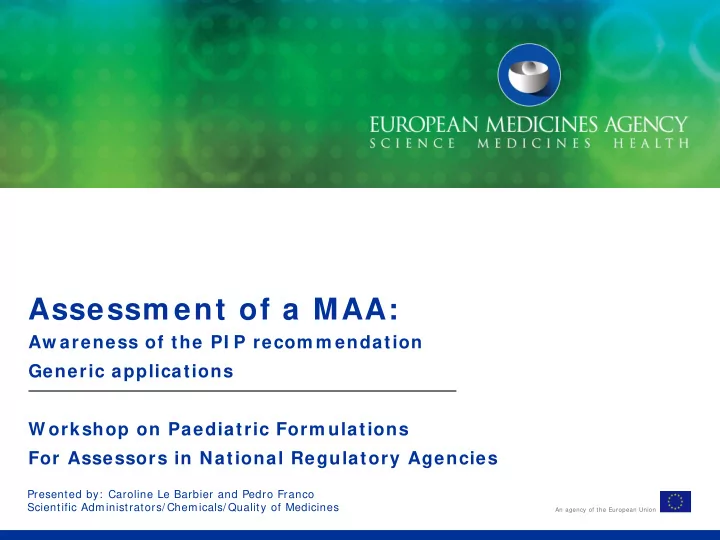

Assessm ent of a MAA: Aw areness of the PI P recom m endation Generic applications W orkshop on Paediatric Form ulations For Assessors in National Regulatory Agencies Presented by: Caroline Le Barbier and Pedro Franco Scientific Administrators/ Chemicals/ Quality of Medicines An agency of the European Union
Agenda Agenda • The Life Cycle of the Medicinal Product • Assessment of Medicines • Assessment of Generics Applications - Paediatrics • Critical Points for Paediatric Formulations • Critical issues during the assessment of paediatric medicines 2
The Life Cycle of the Medicinal Product The Life Cycle of the Medicinal Product Distribution Manufacture Prescription Authorisation Dispensing Clinical Trials Use Research 3
Assessment = Team work Assessment = Team work 4
Assessment of Medicines Assessment of Medicines • Quality • Safety • Efficacy • Risk Management • • “ PIP Recommendation PIP Recommendation” ” “ Benefit Risk Benefit Risk 5
Assessment of Medicines Assessment of Medicines Guidelines Ph. Eur. Guidances Pharmacopoeias Reflection papers Q&A Assessment Scientific Legislation= Directives & Databases & Regulation Assessors Senior Experts Scientific Literature Specialists articles Ref. Books & Encyclopaedias Similar MP Etc. 6
Assessment of Medicines Assessment of Medicines PI Efficacy Assessment Regulatory & Safety issues Assessors PIP Quality 7
MA – – CTD format CTD format MA Module 1 = PI + PIP Recommendation + … . 8
EU - - Generics Generics EU • Same active substance • Same quantity of active substance • Same pharmaceutical form • Bioequivalence demonstrated • No PI P 9
Assessment of Generics Applications- - Paediatrics Paediatrics Assessment of Generics Applications Critical Points QWP & SWP & Relevant Guidelines Guidances PDCO recommendations Generics & Paediatrics Safety issues Safety issues Age-appropriate Formulation Excipients Excipients 10
Critical Points of the Paediatric Critical Points of the Paediatric Formulations (reminder) Formulations (reminder) • Routes of administration • Appropriate dosage forms i.e. – Development of specific paediatric form – Extemporaneous preparations – Size of the tablets • Excipients / Safety issues i.e. – Preservatives – Antioxidants – Colorants – (… ) • Delivery devices • Taste and palatability 11
Case 1 – – Oral solution Oral solution Case 1 • Strength: 50 mg/ ml • Age group: 0 - 18 years 12
Case 1 – – Oral solution Oral solution Case 1 Preservative system Nam e of ingredients Unit form ula / 1 0 0 m l Function 0.500 g = 0.5 % Potassium sorbate Preservative 0.300 g = 0.3 % Sodium methyl Preservative parahydroxybenzoate 0.090 g = 0.09 % Sodium propyl Preservative parahydroxybenzoate 13
Case 1 – – Oral solution Oral solution Case 1 Major objections: • Day 120 - The preservative system is complex and insufficient development pharmaceutics work has been performed … • Day 180 - … Justify the inclusion of Propylparaben in the formulation … • Ground for re-exam ination: • I nclusion of Propylparaben 14
Case 1 – – Oral solution Oral solution Case 1 Applicant's position: – Exposure to propylparaben should not be considered as a cause for concern since it will be a limited exposure CHMP’s position: – … despite propylparaben not being used in food it can be said that propylparaben is widely used in medicines / paediatric population – FUM: To assess the potential risk of propylparaben on the reproductive system of the neonatal rat. 15
Case 2 – – PIP PIP - - Oral suspension Case 2 • Strength: 40 mg/ ml • Age group: ≥ 2 years 16
Case 2 – – PIP PIP - - Oral suspension Case 2 Preservative system Nam e of ingredients m g / m l Function 1.34 = 0.134 % Potassium sorbate Preservative 1.20 = 0.120 % Sodium methyl Preservative parahydroxybenzoate 0.300 = 0.03 % Sodium propyl Preservative parahydroxybenzoate 17
Case 2 – – PIP PIP - - Oral suspension Case 2 Conclusion from the PDCO Formulation Working Group: • The applicant should investigate alternative preservative systems / free from propylparaben 18
Case 3 – – Film-coated tablets Case 3 Age- - appropriate formulation appropriate formulation Age • Active substances: A / B ( Fixed Combination) • Strength: 40 mg / 320 mg & 20 mg / 160 mg & 10 mg / 80 mg • Age group: ≥ 6 Months (crushed tablets) 19
Case 3 – – Film-coated tablets Case 3 Age- - appropriate formulation appropriate formulation Age Peer Review : • The Film-coated tablets only recommended for children ≥ 6 years old • Development of an age appropriate formulation is needed • crushed tablets is not acceptable Day 1 2 0 LoQ • … an update should be provided on the development of the age appropriate formulations as proposed in the PIP 20
Case 4 – – Generic MAA Generic MAA - - Film-coated tablets Case 4 • Active substances: A / B ( Fixed Combination) • Age group: ≥ 6 years 21
Case 4 – – Generic MAA Generic MAA - - Film-coated tablets Case 4 Major objections: • Reference Product = breakable • Generic ≠ not breakable • Day 1 2 0 – Generic should be breakable since a half-dose is recommended for children in the SPC. • Clock stop - Ongoing 22
Case 5 – – Generic MAA Generic MAA - - Film-coated tablets Case 5 • Strength: 150 & 300 mg • Age group: ≥ 6 years 23
Case 5 – – Generic MAA Generic MAA - - Film-coated tablets Case 5 Major objections: • Reference Product = breakable + Oral solution • Generic ≠ not breakable • Day 1 2 0 – Generic should be breakable since a half-dose is recommended for children in the SPC. • Responses to Day 1 2 0 : – Breakable tablets – An oral solution is available 24
Conclusion Conclusion • Keep in mind the PIP recommendation • Keep in mind Critical Points for Paediatric Formulations • Assessment = Team work 25
Questions and Answers 26
Recommend
More recommend